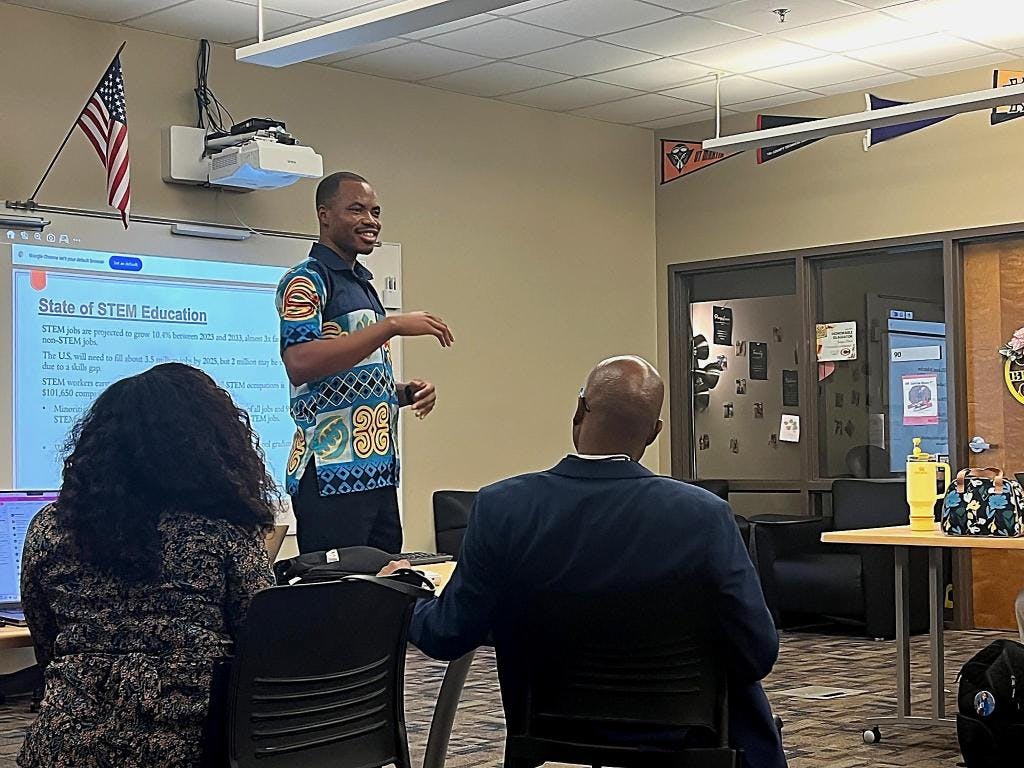Last month, in a wing of the Athens Community Career Academy (ACCA), educators gathered for more than a typical professional development session.
Led by Morgan Z. Faison, clinical associate professor in the Department of Educational Theory and Practice, and her graduate research assistant Matthew Nyaaba (Ph.D. ’27), the session delved into a new frontier for educators: using generative artificial intelligence (GenAI) to design culturally responsive assessments.
“I’ve been leading professional learning sessions with staff at ACCA for the past eight years,” said Faison. “During these sessions, teachers bring lesson plans that they’re developing, and we collaborate and discuss how those lessons can be enhanced.”

Several times throughout the school year, this group, mostly ranging from 10 to 15 staff members, attend professional development sessions for two hours as part of a collaborative partnership Faison started nearly a decade ago.
This year, she is helping teachers modify and adjust their lesson plans and assessments so students experience a higher level of engagement while learning.
“Our professional learning focus is on culturally responsive pedagogy,” said Faison. “The final session of the semester involved thinking about cultural bias in assessments and required teachers to think of ways to better connect new technology, teacher-generated assessments, and references that are familiar to students.”
At the end of April, doctoral candidate Nyaaba led ACCA’s last professional development session of the semester.
The meeting focused on using a theoretical-based GenAI tool housed in the OpenAI ChatGPT platform, called the Culturally Responsive Science Assessment Generator, to generate assessments that factor the cultural and demographic backgrounds of students in a particular classroom.
The goal of the generator is to promote the responsible and ethical use of GenAI to enhance student learning in STEM education, a critical-needs area in terms of student engagement and performance.
“When using GenAI, you have to be very critical about its output,” said Nyaaba, whose research is focused on collaborative designs of culturally responsive assessments in STEM education and how K-12 educators use GenAI. “As teachers, we sometimes struggle to effectively implement culturally responsive pedagogy into lessons and assessments. This led us to develop a GenAI-culturally responsive science framework that was used to prompt and develop a customized GenAI tool, which helps to reduce cultural biases and enhance contextual and cultural responsiveness.”
According to Faison, culturally responsive pedagogy is less about specific content and more about how that content connects to students’ lives.
“It’s a mindset,” she said. “When teachers are creating a lesson, for example, the goal is to connect new knowledge to things students already know, or things they’ve experienced.”

At the Career Academy, that relevance takes many forms.
Students come from across Clarke County’s two high schools—Clarke Central and Cedar Shoals—to spend part or all their school day in career pathway classes ranging from culinary arts and welding to cosmetology and education.
“They’re doing this work not just in math or science, but in career pathway classes,” said Faison. “How do you teach culinary arts in a way that reflects a student’s experience cooking with their family? How do you make the lesson meaningful to them?”
Over the years, Faison has helped support several students from ACCA’s education pathway as they transition into UGA’s teacher preparation programs. She currently serves as chair of ACCA’s education as a profession pathway program.
By prioritizing embedded professional learning, Faison ensures her ongoing, relationship-driven work aligns with what teachers are doing in their classrooms on a day-to-day basis, which increasingly involves using new tools for lesson planning and assessments, including AI.
Nyaaba views the technology not as a replacement for teaching, but as a tool that can help amplify cultural responsiveness. During the session, he demonstrated how to use the framework he developed in ChatGPT for participants who may be interested in implementing similar strategies into their culturally responsive lesson planning.
“When teachers use the base ChatGPT to generate assessments, those assessments may or may not draw largely on students’ lived experiences,” said Nyaaba. “But with our theoretically informed, customized GPT (generative pre-trained transformer), which is embedded with interactive dynamic prompts, GenAI performs better. And that’s what this session is all about—orienting teachers about the existing biases that can be perpetuated by GenAI and introducing how the development and use of our tools reduces that.”
